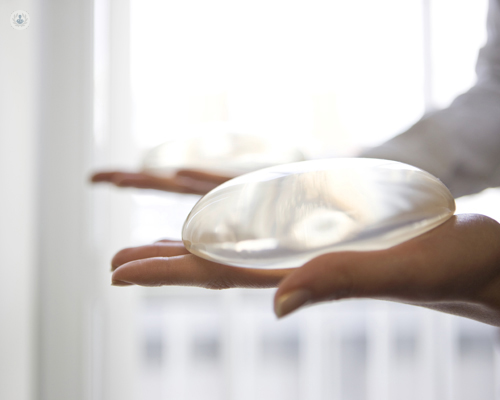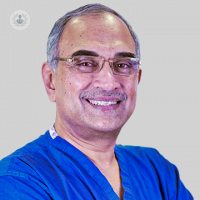Can breast implants make you sick?
Escrito por:As with any surgery, having breast implants has its pros and cons. There are complications patients may encounter. But can breast augmentation surgery make you sick? We asked experienced plastic surgeon Mr Venkat Ramakrishnan about the risks of breast implants.

Can breast implants make you ill?
One of the main concerns is the silicone in the breast implant; that the silicone could spread around the body and cause various diseases. The silicone scare started in 1990 and there has been quite a lot of research into this (indeed, it is still being investigated), but generally, silicone is an inert material – it does not react with any part of the body. It just stays put in one place.
There is a local reaction to the implant itself, which is called a capsule. This capsule is a protective mechanism. The body covers the implant with this capsule and almost makes a cocoon around the implant to keep it away from the rest of the body.
More recently, there's been concern about a type of cancer called anaplastic large cell lymphoma (ALCL), which, in a very small number of cases, can be induced by breast implants. This has been known to us for the last seven or eight years. The type of breast implant I use is the MENTOR implant, and there are two types of these – rough surface implants and smooth surface implants. With the rough surface MENTOR implant, the chance of getting ALCL is one in 80,000, while with a smooth implant, the chances are almost non-existent.
These are the concerns we have about breast implants and health.
Are there any risks to having breast implants?
As with any operating procedure, there are risks. Risks immediately after the operation include bleeding and infection, but they're extremely rare. Other problems include:
- Malposition of the implant – if the implant has been placed slightly too high or too low
- Stretch marks – the skin can be stretched very acutely, very suddenly by the implant, especially in younger patients who choose very large implants.
- Numbness – the larger the implant, the more numbness
- Sagging much earlier than expected – due to the weight of larger implants.
The long-term issue with the implant is encapsulation. Over a period of time, the scar tissue around implant develops like an onion peel, gaining more layers over a period of time. In 10-15 years’ time, the scar could be so thick that the implant is not soft any more. When you feel the implant, what you're feeling is really the scar tissue and this might also cause discomfort, pain and tenderness. This could be a reason for removing the implant (and the scar tissue) and replace it with a new implant long-term.
Finally, there is a risk of anaplastic large cell lymphoma, but the risk of this with a good quality implant is minimal.
Does having implants make it harder to detect cancer?
The question of whether having an implant makes it harder to detect cancer is a very valid concern, especially in younger patients who have implants, because one in 10 women get breast cancer in the normal population and there is no reason to think that patients with breast implants would be any different.
Usually, we use a mammogram to screen the breast for any cancer. When you have an implant, there is a possibility that it can cast a shadow and hide little bits of the breast. In these instances, we will add an ultrasound as an additional procedure to screen the rest of the breast, as it may be that a simple mammogram might not do.
When the implant is under the muscle, the whole breast tissue and the muscle is pushed forward, so it is a bit easier to use a mammogram and see all the nooks and crannies of the breast than when the implant is within the breast itself; that is, in front of the muscle. When the implant is in front of the muscle, there is a fascial covering which covers the implant, which keeps all the breast tissue in front of the implant, so very little to no breast tissue is behind the implant.
The bottom line is that it is quite possible to make sure that there is nothing sinister in the breast, even in the presence of the implant.
Visit Mr Ramakrishnan’s profile to learn more or book an appointment.


